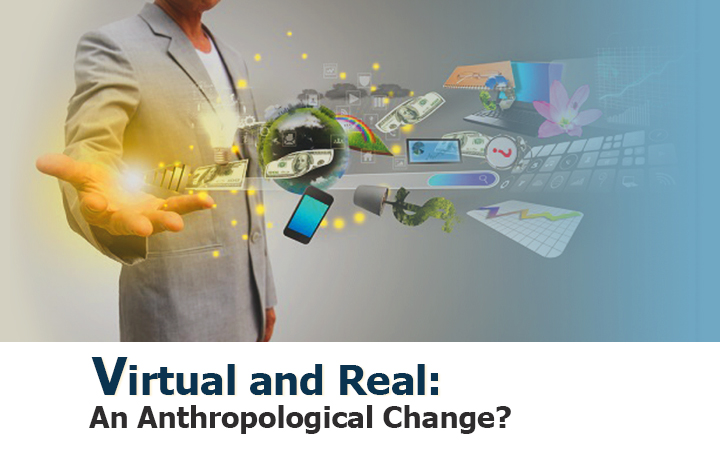The technological achievements of the Net and of bioelectronics are producing social and economic upheavals on the worldwide level. Technology is influencing the evolution of culture by means of changes that also involve the human being’s conception of him/ herself. Today’s technological culture tends to reduce the human being to a mechanical corporeality or to communicative immateriality, constricting the person’s interior life and modifying his/her perception of the world and of self.
The comparison between “real” and “virtual” is at the heart of this anthropological change, with consequent effects on human life and on social interactions.
What is real? What is virtual?
What do we mean when we say “real” or “virtual”? Are we referring to material things or to thoughts? Do we consider the present moment as real and the future as virtual?
The Greek philosophers raised many questions about “being” and “becoming,” about potential and act, about tangible knowledge and conceptual knowledge. The Latins, a concrete people, were not familiar with the term “virtualis.” But they did think about virtus–worth, excellence, positive moral or physical behavior–to be put into concrete practice. Virtus is simultaneously potential and act, virtuality and concrete reality.
Philosophical questions seem foreign to today’s widespread culture, which is spurred on by science and a certain materialistic view of life. Today, in common thought, the “real world” consists of everything that is tangible, actual, perceptible to the senses, while the “virtual world” consists of things that are imaginary and/or possible.
However, computer science and network technologies have changed the meaning of “real” and “virtual” because they have altered our way of knowing things and have transformed the way in which we relate to others. In the world of the Internet, “real” and “virtual” tend to coincide, relationships are distant but at the same time close, and it would be well to reflect on the consequences of this.
The Human Being: Caught between “Real” and “Virtual”
The relationship between real and virtual has anthropological implications. If what is actual and what is possible coincide, if digital and immaterial things are as real as tangible things, then what happens to a person’s spiritual life? What about the truths of faith? What about religious sentiments? Are they perhaps restricted to a virtual space, to a subjective experience that cannot be shared? Language too has been modified by the technological culture, which means we have to find forms of communication that transmit the faith in an understandable way. Let us consider just two examples of this: intelligence and the way we to relate to others. Intelligence, understood as the capacity to understand, is identified with the artificial intelligence of the computer: a rational, functional intelligence predetermined by the algorithms followed.
It certainly doesn’t mean the capacity for thought or self-awareness. And the human being’s ability to relate to others is transferred via the Net to devices that imitate human behavior to the point that a device uses a human voice to answer questions. Little by little, human beings and machines seem to be taking on greater similarity.
What About the Future
What the future will be like merits reflection and is summed up by the question of Nicolas Carr: “Is the Internet making us stupid?” To which Derrick De Kerchove replies: “Will the Net make us stupid?” The first believes that the Internet induces superficial learning, limits our attention span, does not stimulate our critical sense and makes us homologated conformists. The second acknowledges the effects of the Net on our way of thinking, knowing and reasoning, but argues that, despite these problematic aspects, the positive potentials of the Net liberate mental resources, which people can then use creatively, to the point of hypothesizing the advent of a new Renaissance.
An Ongoing Debate
The debate is open and touches needs and temptations deeply rooted in the human spirit, that is, to be able to achieve, through technology, omnipotence, omniscience, success, power, immortality. Information technology devices allow us to control everyone and everything; they offer us a sea of information without the hard work of research and memory. The Net allows us to become popular effortlessly and to find consensus there, thus overcoming loneliness. Electronic and mechanical “prostheses” replace parts of the human body, restoring a person to physical completeness.
Enthusiasm for the successes of technology leads us to neglect things that we run the risk losing because we delegate to machines and algorithms duties and responsibilities, quality information and truth, and also the protection of personal privacy. But the world of technology is also limited and imperfect. It can make mistakes and can malfunction. And we must always keep in mind that technology responds to the logic of economics and has unsurpassable objective limitations.
Because of all these aspects, thinking about the human being of the future–which will be technological–means tackling fundamental ethical issue and questioning the nature of the human being. This task cannot be left to technicians, but neither can philosophers and theologians do it alone. A technological future on a human scale can only be achieved if everyone makes the effort to become aware of what is going on.

